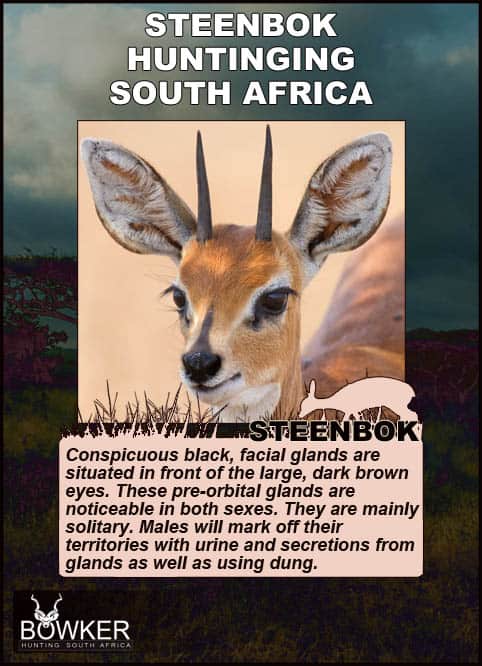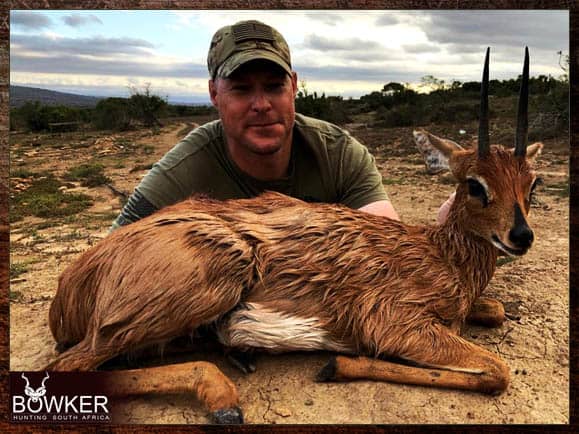Patience is critical when Steenbok Trophy Hunting. A small antelope with a coat is any shade from fawn to rufous. Males have horns, while females do not.
There are no seasonal restrictions on Steenbok rifle hunting in Eastern Cape, South Africa. Nick Bowker Hunting offers Steenbok African hunting trips year-round.
It’s a hugely underrated trophy. This is mainly due to their size or because so few people notice them or have the time to study them before they disappear over the horizon.
A hunt in South Africa should always include a trophy steenbok.
They can be added to any of our hunt packages cheaply. Steenbok prices are as little as $250 in Africa.
Hunters on safaris with Nick Bowker stay at our upmarket hunt lodge, Hopewell.
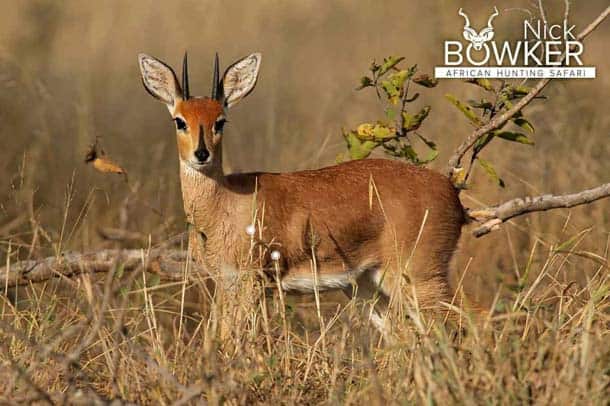
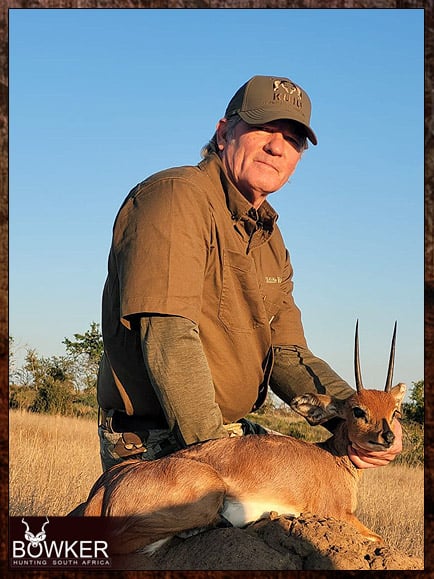
Table of Contents
Steenbok Hunting Trophy Fees in South Africa -2025
The average price of a steenbok is around $250. Steenbok can be added to any of our African hunting safari packages.
Our price for 2025 is $250.
The Steenbok trophy hunt includes a licensed hunting guide, a hunting license, and all permits.
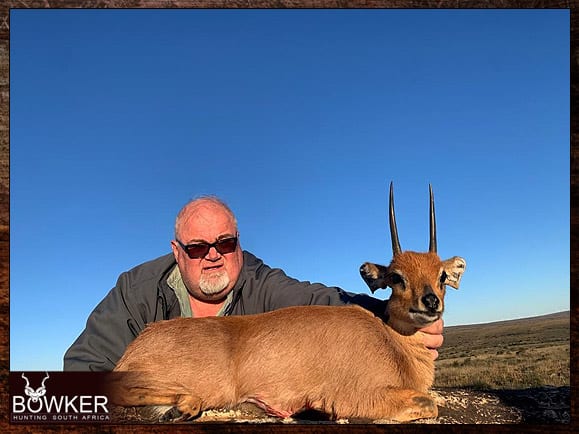
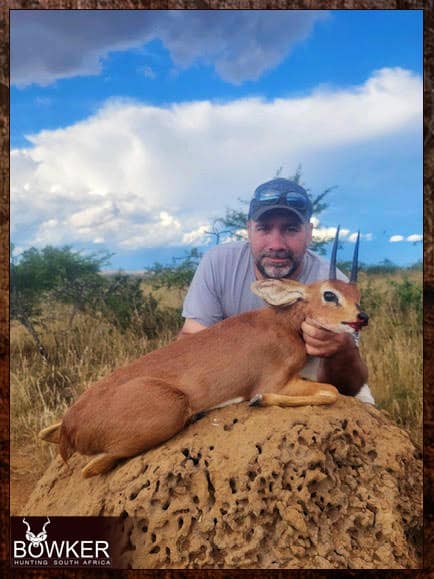
Hunting Steenbok in South Africa

Shot placement must be in the bottom third of the animal directly above the front shoulder. This will ensure a heart or lung shot. Avoid head and neck shots, which are high-risk.
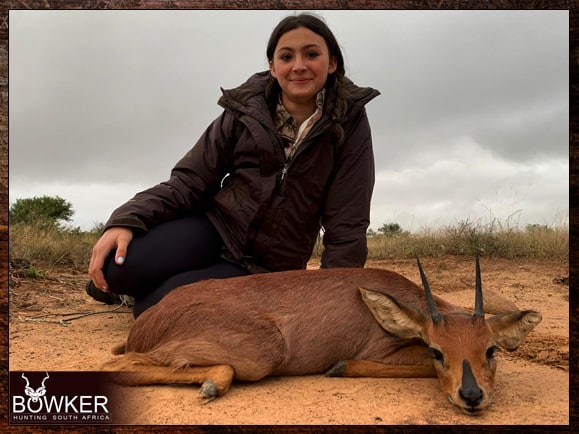
Your steenbok ram trophy should have an average shoulder height of around 22 inches, weigh about 25 pounds, and have a Horn Length of approximately 4 inches.
The Safari Club International minimum score for a steenbok is 8. This is measured by adding the length of each horn as well as the circumference of the bases.
They are underrated trophies, mainly due to their size or that they are rarely noticed before they disappear over the horizon during a plains game hunt.
Hunting areas are on the open plains and can be taken opportunistically while game hunting other trophies.

This little antelope gets its name from the Dutch settlers who traveled to Africa.
The word “Steen” means brick – as you can well imagine, the color of the Steenbok resembled that of a red building brick and thereby got the name steenbok.
The African steenbok is a magnificent trophy to add to any trophy room.
An ideal and cheap trophy to add to our seven animal packages, which include big game trophies such as Kudu, blesbok, waterbuck, and black wildebeest.
Trophy Judgement and Rifle Caliber for Trophy Steenbok
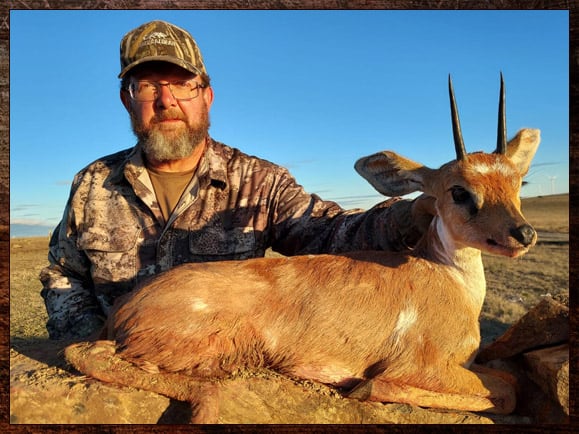
Juveniles take flight when adults approach. When hunting Steenbok, he will lie flat in the grass to avoid detection and flatten his ears.
He will only flush at the last moment, running away with astonishing speed.
It is a challenging hunt and quarry to approach on the open plains. This antelope often pauses to look back before continuing his flight; the hunter should be ready to take the shot.

As a caliber, we would recommend the 243 for hunts.
For those hunters who wish to avoid going through the red tape of bringing a rifle into South Africa, Nick Bowker Hunting has a 243 fitted with a Swarovski Z8 tactical scope.
We use Sako factory ammunition.
Mainly a browser, he will occasionally graze on newly sprouted grass.

The Difference Between a Male and Female Steenbok for Hunts
Males have horns, while females do not.
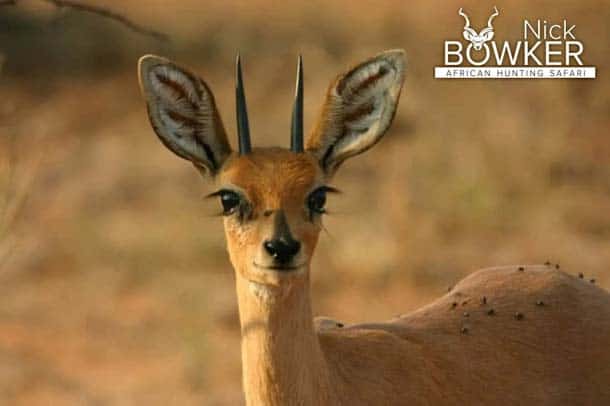
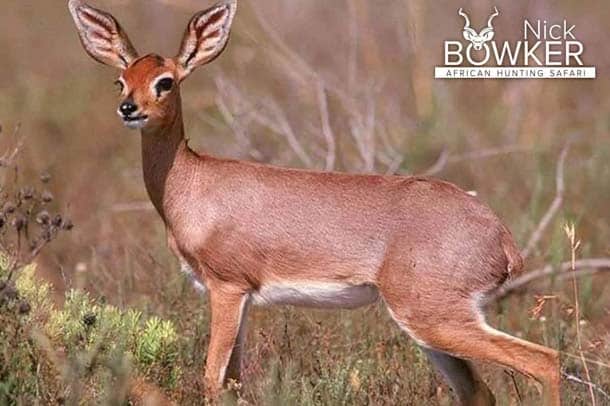
Interesting Facts about the Steenbok for Your Hunt
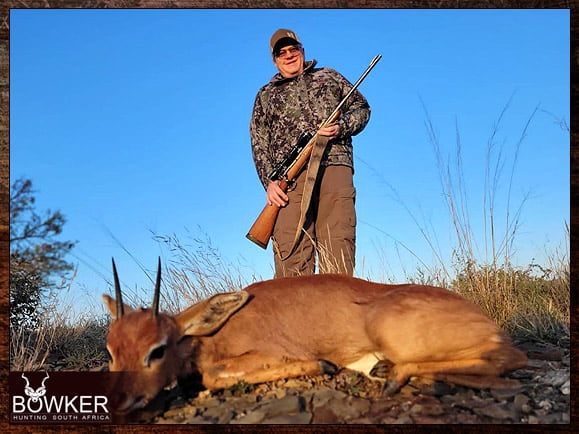
- They form mating pairs that share a defended territory. However, they forage and rest away from one another. This is probably because it is less conspicuous in their habitat.
- The steenbok will scrape the ground before, during, and after defecating and urinating and sometimes bury their dung.
- This action is to demarcate territory and is done by both males and females.
- They have glands below their eyes, but they do not like other antelopes who use them for scent marking. Instead, they will use glands between their hooves for this purpose.
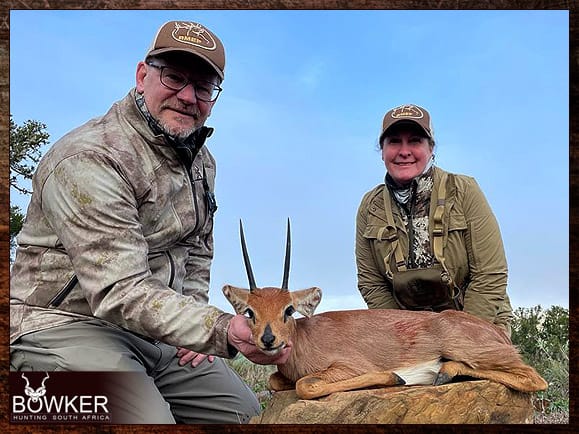
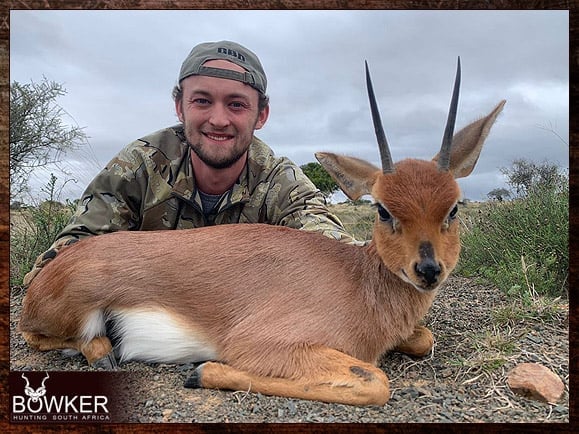
- They will browse and graze depending on what is available due to their location and the season.
- When grazing, they can rapidly increase the micro-organisms in their stomach to break down the fiber.
- They hide in old aardvark holes when the cover is sparse.
- The steenbok name is derived from the Afrikaans word – Steen, meaning brick due to its brick-red coloration.
- Hunting steenbok – all hunters should take a steenbok if the opportunity presents itself.
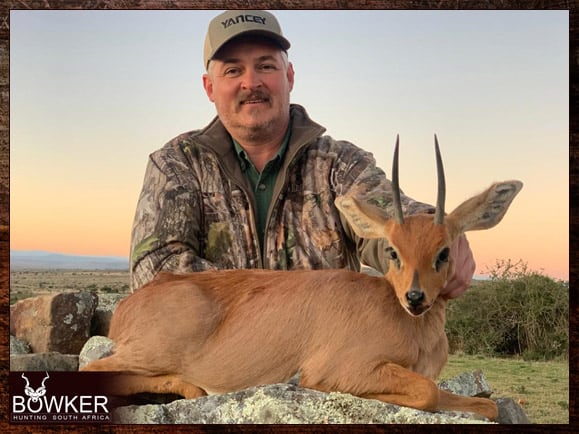
About the Steenbok for Hunters
Description of steenbok
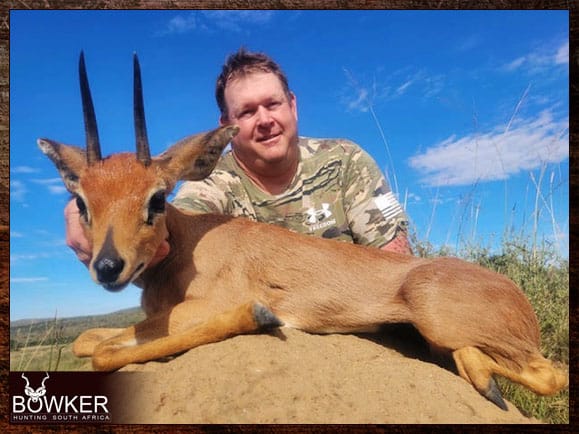
Steenbok resembles a small Oribi, standing 18-24 inches at the shoulder.
Their pelage (coat) is any shade from fawn to rufous.
The Steenbok’s underside and the chin and throat are white, as is the ring around the eye. Their ears are large and have “finger marks” on the inside.
Males have straight, smooth, parallel horns of around 4 inches.
The tail is not usually visible, only an inch or so long.
They are active during the day and the night; however, during hotter periods, they rest under shade during the day’s heat.
They typically lie low in the vegetation at the first sign of trouble.
If a predator approaches, a steenbok will leap away and follow a zigzag path to shake off the attacker.
Escaping, Steenbok frequently stops to look back.
They are known to take refuge in the burrows of Aardvarks.
Known predators include:
- Southern African wildcat
- Caracal
- Jackals
- leopards
- Martial eagles
- Pythons.
Information for steenbok hunting
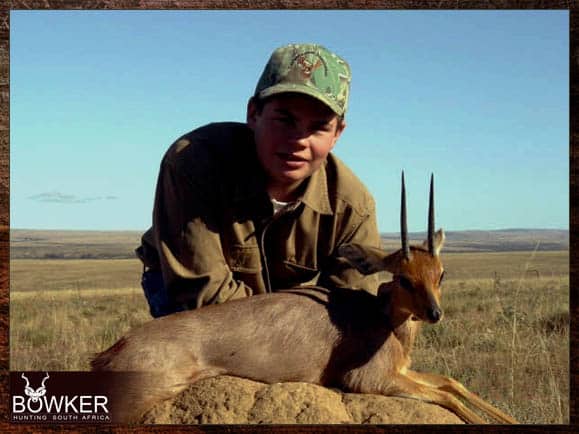
Steenbok is typically solitary, except when a pair comes together to mate.
A pair occupies consistent territories while living independently, staying in contact through scent markings to determine their partner’s whereabouts.
They are browsers and are very selective of greens such as flowers, fruits, shoot tips, new leaves, and various plants.
Its selective feeding habits enable it to be independent of open water sources.
It rakes and digs for tubers, roots, and bulbs that contain moisture and are high in nutrients during dry months.
A single lamb weighing 1 kg is born after a gestation period of about seven months.
The mother hides her young for the first 3 to 4 months after birth and only feeds her lamb in the early morning and late afternoon.
During her visits, she eats her young’s dung and drinks its urine to eliminate odors that make it detectable to predators.
Frequently Asked Questions
How much does it cost to hunt a Steenbok?
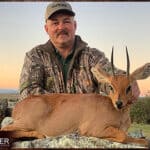
The trophy fee for a standalone Steenbok hunt is between $200 and $300. Daily rates vary between $250 and $500 per day.
Included in the Steenbok trophy fee is a licensed guide. As well as a hunting license and all permits.
How to hunt Steenbok?

Hunted on the open plains and often pausing to look back before continuing his flight, the hunter should be ready to take the shot.
Where do you shoot a Steenbok?
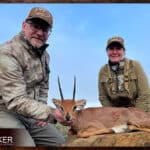
Shot placement must be in the bottom third of the animal directly above the front shoulder. This will ensure a heart or lung shot. Avoid head and neck shots, which are high-risk.
What is a trophy, Steenbok?
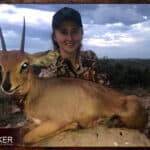
Steenbok trophies have a Horn Length of approximately 4 inches. The minimum qualification score under Safari Club International for a Steenbok is 12. Add the length of each horn and the circumference of the bases to get your SCI score.
How do you judge a Steenbok trophy?

Horn tips that are level with the top of the ears are about 4 inches long and make for an excellent trophy.
Seasonal Restrictions
When can you hunt Steenbok in South Africa?
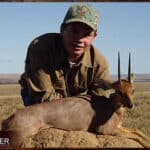
There are no seasonal restrictions on steenbok hunting in the Eastern Cape of South Africa for most outfitters.
The Steenbok in Pictures

